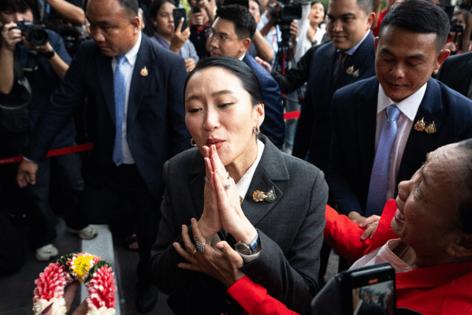Thailand faces deeper political turmoil as court ousts premier
Published in News & Features
Thailand was thrust into deeper political crisis after the country’s Constitutional Court dismissed Prime Minister Paetongtarn Shinawatra for ethics violations, setting off political jostling for a third leader in two years.
The nine-member court said Paetongtarn violated constitutional provisions on ethical standards during a phone call in June with de facto Cambodian leader Hun Sen, when they discussed a border dispute between the countries. The judges said her remarks on the call, which were leaked, undermined the pride of the premiership and the nation while prioritizing her political interests. The 6-3 decision is final and not open to appeal.
Paetongtarn, 39, is the third member of the influential family of Thaksin Shinawatra to be forced from power before finishing a term, and throws into doubt an accommodation he reached with his rivals that kept his hands on the levers of power.
That deal, which helped him return to Thailand after 15 years in self-imposed exile, paved the way for his family-backed Pheu Thai Party to form a government with conservative groups, which had previously opposed him.
After the verdict, Thailand’s benchmark stock index closed down 1.1%, while the baht lost 0.2% against the U.S. dollar.
The case against Paetongtarn arose from a petition by a group of senators accusing her of violating ethics rules during her phone call with Cambodia’s Hun Sen, who’s had close ties to Thaksin, her father. As the border dispute between the countries escalated, Hun Sen released a recording of the call, in which Paetongtarn addressed him as “uncle” and appeared critical of Thailand’s military.
The court on Friday highlighted that she had told Hun Sen that she would see to “whatever requests” he had for her.
Her remarks drew backlash from the public and conservative politicians — who accused her of bowing to a foreign leader and undermining national interests — and sparked protests demanding her resignation. Paetongtarn apologized, saying the call was recorded without her knowledge, but denied wrongdoing and maintained her intent was to ease tensions with Cambodia. She had been suspended by the court since July 1.
The border tension soon escalated into the bloodiest clashes between the two countries in decades that left more than 40 people dead and displaced hundreds of thousands civilians on either side. While a U.S.-backed ceasefire halted fighting, land border crossings remain shut for trade and mobility with both the sides stationing troops along their contested frontier.
The court said her criticism of Thai army created a societal division. After the court ruling on Friday, Paetongtarn said she accepted the verdict, and her intention was to save the lives of people and soldiers.
‘Decline of Shinawatras’
A criminal court in Bangkok last week acquitted Thaksin of a royal defamation charge, seen by analysts as a sign he still had the backing of the establishment. But Paetongtarn’s sacking shows the clan, which has held sway over Thai politics for more than two decades, is on the decline, according to Titipol Phakdeewanich, political science lecturer at Ubon Ratchathani University.
“Paetongtarn’s dismissal leads to increased political instability and a steeper decline in the power of the Shinawatras,” Titipol said. “This throws everything into a limbo once again.”
Under the Thai constitution, a prime minister is selected through a parliamentary vote.
The coalition helmed by Pheu Thai may now push its sole remaining eligible candidate, Chaikasem Nitisiri, for prime minister. Anutin Charnvirakul of the opposition Bhumjaithai Party is also seen as a challenger. It could either join hands with Pheu Thai or form a competing coalition group with the help of the opposition People’s Party, the single biggest group in Thai parliament.
Investor confidence
Thailand’s top business group warned that the unfolding political turmoil is set to heighten risks for the $550 billion economy and hurt investor confidence both at home and abroad. Any delay in the formation of a new government could disrupt budget spending and hinder trade negotiations with the U.S. and resolution of border issues with Cambodia, the Federation of Thai Industries said.
Foreign investors have sold a net $2.3 billion of Thai stocks this year as near-constant political instability worsens the outlook for an economy that has posted an average of 2% annual growth in the past decade, far behind regional peers such as Indonesia and the Philippines.
Tamara Mast Henderson, an economist with Bloomberg Economics, said the ensuing leadership change could reinvigorate the economic agenda - enabling strong measures that improve competitiveness and unlock stronger medium- to long-term growth.
“The next government is more likely to remain near-sighted - leaning on quick handouts and maintaining pressure on the central bank to keep policy looser than it should,” Tamara wrote in a note.
Paetongtarn became prime minister in August 2024 after her predecessor, Srettha Thavisin, was ousted by the Constitutional Court over the similar accusations of lacking integrity and violating ethical standards. The court, set up in 1997, has now ousted five sitting Thai prime ministers linked to Thaksin, including his daughter, sister, and brother-in-law.
The legal troubles for the Shinawatras are far from over. Thaksin also faces a decision by the Supreme Court next month over whether he met the conditions of a one-year prison sentence for a corruption conviction. Paetongtarn’s rivals have also targeted her with multiple petitions seeking her ouster at the anti-graft commission and the election agency.
-----------
—With assistance from Anuchit Nguyen, Eduard Gismatullin, Lee Miller, Suttinee Yuvejwattana and Pathom Sangwongwanich.
©2025 Bloomberg L.P. Visit bloomberg.com. Distributed by Tribune Content Agency, LLC.







Comments